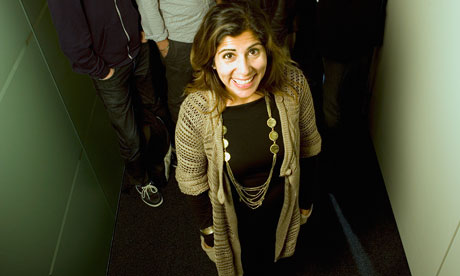
Known as the "queen of startups" within the UK technology sector, Bindi Karia has taken up a curious vantage point of all that she surveys. With a seat at the table of a multinational company with a cash pile of $35bn (£22bn), she spends most of her time breaking bread with companies yet to move out of their bedroom offices.
Karia, who grew up in Canada but now lives in London, works for Microsoft, where she has the title of "emerging business lead" and manages a programme called BizSpark. This helps startups across Europe – more than 600 in the UK alone in the course of six months – providing them not with funding, but expert advice and access to Microsoft development tools.
Karia is also on the advisory board of Seedcamp – a European investor programme dubbed the "X Factor for startups" – and it's her belief that the next Bill Gates might well not be found in a company like her own, at least in the first instance, but working from home, equipped only with their own bright idea.
How did you acquire your "queen of startups" moniker? And how does that sit with your official job title?
It was a blogger that started that – and now in the Bing search of my name, it's one of the first things that comes up. It's flattering, to be honest.
The startup mentality is very different to the exec-level mentality at Microsoft, but I think I'm suited to it because I've been there before. I was around during the first dotcom boom and got involved with a lot of really cool startups, so I caught the bug then.
I have had moments where I've seen entrepreneurs euphoric because they've closed a massive deal; I've also been at the other end where they've had to declare bankruptcy on their company to protect their employees and to protect their intellectual property. And I once had to take redundancy myself, so I know what it's like to have to bootstrap, roll your sleeves up and turn on a dime.
Why does a company such as Microsoft bother with a team such as yours?
Our team originated in Silicon Valley [in California] and originally it was to build up relationships with venture capitalists but also it was about encouraging early-stage technology companies to adopt our technology. Why? Because those companies are our future in a lot of ways. Something like 95% of our revenue comes from partners, so this is about building the next generation of partners.
So if I'm a kid in my bedroom who's written a brilliant piece of software, what's in it for me, working with you? Free software, and mentoring and support and the community that surrounds BizSpark – there are a lot of network partners and you get access to that. It's a global community: you can register on our site and profile your company in a way you may not get if you go for it on your own.
Some commentators says programmes such as BizSpark are like drug pushers, hooking young companies on free goodies before hitting them with costs down the line...
I'd disagree with that analogy. I think the startups realise what's in it for us.
What is the state of the UK startup ecosystem, given the recession?
The UK startup ecosystem is vibrant, it's really healthy. A lot of people are starting to go for it. Have no fear!
I hear a lot of people banging on about startups needing focus. I'd say, if you try boiling the ocean with the product you're trying to build, it becomes that much harder. Just make sure your product solves a problem.
What chance is there of the next Twitter or Facebook coming out of the UK?
I don't think there are any great barriers – although in the UK, investors are a bit more conservative.
The world in which you work: as an Asian woman, is life easier than it would be in a traditional sector of the economy?
Hard to say. I've grown up around a family of entrepreneurs and they took risks, so I think I've inherited that attitude. My role now is about growing the startup ecosystem and the community in the UK and continuing to work closely with success stories.
There's real satisfaction in thinking I might be able to help by navigating a large whale like Microsoft.

